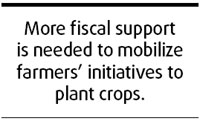Make farming profitable
(China Daily)
Updated: 2008-04-28 07:16
Updated: 2008-04-28 07:16
In the face of surging food prices worldwide, the central government's assurance of a stable supply based on ample stocks is crucial to keeping domestic grain prices in check for the moment.
Premier Wen Jiabao had said earlier that China has abundant grain reserves amounting to 150 million to 200 million tons. With such a huge stock that equals 30 to 40 percent of the country's annual grain production, it makes little sense to doubt the Chinese people's capability to feed themselves.

However, to address growing concerns over long-term grain prices, the authorities should encourage farmers to increase production with more fiscal incentives.
The central government has promised to increase policy support for agriculture with clearer, straighter and stronger signals to mobilize and protect farmers' initiatives to plant crops.
Among other fiscal supports aimed at lowering costs of farming inputs, the government has raised its minimum purchase prices for rice and wheat twice so far this year.
Given that China's price inflation reached its highest level in more than a decade now, any measure to stabilize food prices is more than needed. This is especially necessary because food prices have a major impact on inflation.
But the problem is that such fiscal incentives are still far from enough.
A recent report by CCTV found that as much as 11 percent of arable land in Chongqing are no longer used for growing grain due to low profits. At the current price level, farmers can earn only about 500 yuan by growing one mu of rice without taking into consideration their labor cost. On the other hand, they can make thousands of yuan from urban jobs as migrant workers.
As a rule of thumb, it is rational for individual farmers to choose more rewarding urban jobs. Yet, the falling enthusiasm among farmers for grain production does not bode well for the country's long-term grain supply. Policymakers must respond quickly to the problem.
Although farm produce sold at higher prices last year, farmers complained the benefits were eroded by production costs that rose at a much faster pace.
The ongoing surge of global grain prices is a market signal to encourage bigger supply. But if policymakers decide that it is more urgent to fight inflation and thus necessary to keep domestic grain prices stable, they must come up with more fiscal subsidies to compensate grain-growing farmers to keep them from moving to other jobs.
(China Daily 04/28/2008 page4)
|
|
|
|